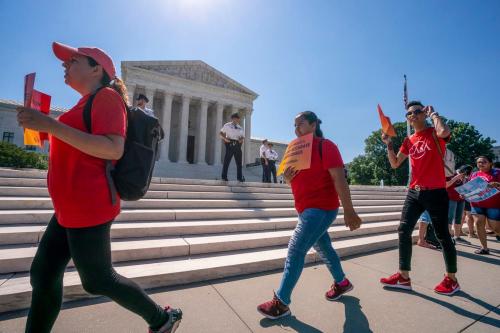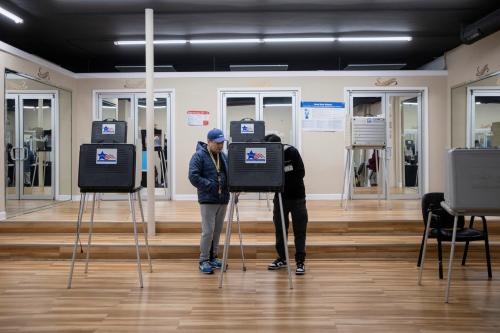In a major defeat for his administration, President Trump on Thursday announced he will no longer fight to keep the citizenship question on the 2020 census. This follows his administration’s more than yearlong efforts in the courts, in an attempt to skew the results of the census by undercounting immigrant minorities and bolster the representation of his political base. Or as Nancy Pelosi has put it, “to make America white again.”
The effort to place this question on the census was based on what the Supreme Court stated as a “contrived” rationale: to better enforce the 1965 Voting Rights Act. This rationale was hotly contested by civil rights groups, professional associations, cities and a plurality of state attorneys general who attributed it to more nefarious motivations of the administration.
Major winners from Trump’s capitulation are cities and neighborhoods with significant foreign born, noncitizen populations. If the citizenship question was included on the census, an estimated nine million members of such populations, including large numbers of Hispanic and Asian residents, would likely not fill out their census forms. Many would fear having information shared with law enforcement or being subject to other forms of harassment in the current political environment.
If the citizenship question was included on the census, an estimated nine million members of such populations, including large numbers of Hispanic and Asian residents, would likely not fill out their census forms.
These groups are among the nation’s most youthful, fastest growing populations and heavily located in urban areas—including metropolitan areas like Miami, Los Angeles, and Houston. Their under enumeration would have robbed these communities of their fair shares of an estimated $900 billion in government assistance that is allocated according to census counts, including funds for housing assistance, job training, community development and social services.
Also winning are high immigration states that stood to lose seats in Congress that they would otherwise hold on to. The constitutionally mandated purpose for conducting the census is to reapportion the House of Representatives and, by extension, the Electoral College. If the citizenship question were included on the 2020 census, California almost certainly would have lost a seat according to several studies. Other potential losers would be New York, as well as some of the nation’s fastest growing states, such as Texas, Arizona and Florida.
Perhaps the biggest gain for preserving a democratic representative government is the ability to maintain a fair redistricting of legislative districts within states. The census is used to create state legislative districts as well as congressional districts to reflect local representation with similar sized populations. At risk with a flawed census that selectively underenumerates specific groups—immigrants, racial minorities, and urban residents—is that these groups would count less in decision-making regarding state and federal laws.
Perhaps the biggest gain for preserving a democratic representative government is the ability to maintain a fair redistricting of legislative districts within states.
An even more dangerous outcome along these lines would have been if the availability of citizenship information for all individuals would have tempted state legislatures to use the citizen voting aged population rather than the total population to draw these districts. The elimination of children under age 18, let alone noncitizens, would clearly make these districts appear whiter, older and more rural than that of the total populations that should be represented.
While the citizen population is not currently used for this purpose and is subject to further court ruling, many believe that redistricting was the primary motive for Trump’s attempted introduction of the citizenship question on the census. Recently uncovered documents by deceased Republican strategist Thomas Hofeller, who had been in discussions with the administration, demonstrate that this kind of redistricting would be advantageous to “Republicans and Non-Hispanic Whites.”
Other big winners from the omission of the citizenship question on the 2020 census are public and private sector decisionmakers who rely on accurate surveys that will be taken over the entire next decade and are based on the census sampling frame. These data inform decisions of where to locate hospitals, parks, schools, employment sites, housing construction and retail establishments. A flawed census would have deprived underenumerated groups with access to services and provide businesses with skewed information about potential customers and workers.
Undoubtedly the biggest gain from this outcome will be the reestablishment of the census as a civic engagement exercise that is part of our democracy.
Undoubtedly the biggest gain from this outcome will be the reestablishment of the census as a civic engagement exercise that is part of our democracy. It allows all residents to proclaim that they are part of this great country and, by virtue of the Constitution, ensures that they will be fairly represented in Congress. While the omission of the citizenship question may not prevent future attempts by the Trump administration and others to politicize the census and discourage some to participate, we can count on the groups who successfully fought the citizenship question to promote widespread participation in the census in communities across the country. Trump’s announcement that he will end his fight to put this question on the census is a win for those groups and, more importantly, a big win for the nation.







Commentary
America wins as Trump abandons the citizenship question from the 2020 census
July 12, 2019